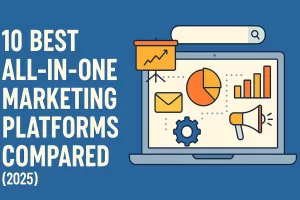
Introduction:
Why All-in-One Marketing Platforms Are Essential in 2025
In today’s ultra-competitive digital space, businesses need smarter, faster, and more integrated ways to manage their marketing. Gone are the days of juggling ten different tools for email, ads, analytics, and automation. In 2025, all-in-one marketing platforms are the game changers. These tools combine email marketing, CRM, automation, analytics, SEO tools, social media scheduling, and more—all in one dashboard.
But with so many options out there, how do you choose the best one? We’ve done the heavy lifting for you.
Here’s your ultimate comparison of the 10 best all-in-one marketing platforms in 2025—based on features, pricing, scalability, and user-friendliness.
What Makes a Great All-in-One Marketing Platform?
Before we dive into the comparison, let’s talk about what separates the best from the rest. A top-tier marketing platform in 2025 should offer:
1. Seamless Integration
Whether it's your CRM, CMS, or eCommerce platform, integrations should be plug-and-play.
2. Automation & AI-Driven Insights
Smart marketing tools don’t just automate tasks—they offer AI recommendations, predict trends, and personalize experiences.
3. Multi-Channel Marketing
From email to SMS, social media to push notifications, the platform should support omnichannel communication.
4. Robust Analytics
Advanced performance dashboards, conversion tracking, and campaign ROI measurement should come standard.
5. Scalability
Whether you're a startup or scaling enterprise, the tool must grow with your business.
Top 10 All-in-One Marketing Platforms for 2025
Let’s break down the 10 best all-in-one marketing platforms in 2025 based on real features, usability, and performance.
1. HubSpot Marketing Hub
Overview
HubSpot remains a heavyweight in 2025 for a reason. Its Marketing Hub offers CRM, email, SEO, content, social media, and analytics in one platform.
Key Features
- Drag-and-drop email builder
- Smart CRM and lead scoring
- Social media management
- Advanced SEO recommendations
- AI-driven A/B testing
Pros
- User-friendly interface
- Strong support and resources
- Excellent automation workflows
Cons
- Expensive for advanced tiers
Best For
Mid-size to enterprise-level businesses focused on inbound marketing.
2. ActiveCampaign
Overview
Perfect for businesses that want deep email automation and smart CRM features. ActiveCampaign is a rising star in behavior-based automation.
Key Features
- Advanced email sequences
- CRM with pipeline automation
- Machine learning predictive sending
- SMS marketing and site tracking
Pros
- Exceptional automation
- Highly customizable workflows
Cons
- Slightly steeper learning curve
Best For
SMBs and online retailers needing tailored automation.
3. Brevo (formerly Sendinblue)
Overview
Rebranded and supercharged, Brevo is ideal for small businesses and agencies. It includes email, SMS, landing pages, and chat in one platform.
Key Features
- Multi-channel campaigns
- CRM integration
- Transactional email/SMS
- Chatbot and inbox features
Pros
- Free plan available
- Intuitive UI
Cons
- Reporting is limited compared to others
Best For
Startups and growing small businesses.
4. Klaviyo
Overview
Especially popular in the eCommerce space, Klaviyo is built for revenue-focused brands. Seamless integration with platforms like Shopify and WooCommerce.
Key Features
- Deep eCommerce integrations
- Predictive analytics and AI segmentation
- SMS and email automation
Pros
- Revenue attribution tracking
- Pre-built templates for Shopify
Cons
- Pricing can grow quickly
Best For
eCommerce businesses looking to scale.
5. Zoho Marketing Plus
Overview
Zoho's all-in-one suite ties together marketing, CRM, and collaboration tools. Great for companies already using Zoho ecosystem.
Key Features
- Social media scheduling
- Email and SMS marketing
- Marketing automation and CRM
- Webinar and survey tools
Pros
- Unified dashboard
- Budget-friendly
Cons
- Interface isn’t as modern as others
Best For
Budget-conscious businesses using Zoho apps.
6. GetResponse MAX
Overview
A powerful platform for mid-to-large organizations, GetResponse MAX includes webinars, email marketing, push notifications, and SMS.
Key Features
- Webinar hosting
- Conversion funnels
- Paid ads integration
- AI email generator
Pros
- Built-in conversion tools
- Webinar functionality
Cons
- Lacks advanced CRM features
Best For
Coaches, consultants, and content creators.
7. Mailchimp (Now by Intuit)
Overview
Still going strong, Mailchimp continues to improve under Intuit’s ownership. It now includes automation, CRM, and website tools.
Key Features
- Drag-and-drop editor
- AI content creation
- Journey builder
- Reporting and analytics
Pros
- Easy to use
- Free plan available
Cons
- Limited automation compared to others
Best For
Freelancers, creators, and very small businesses.
8. Systeme.io
Overview
A true all-in-one platform designed for digital marketers, creators, and course sellers. Think of it as a ClickFunnels alternative—at a better price.
Key Features
- Funnel builder
- Email and SMS marketing
- Membership and course hosting
- Affiliate management
Pros
- Affordable pricing
- No technical skills required
Cons
- Limited customization options
Best For
Online coaches, course creators, and solopreneurs.
9. Keap (formerly Infusionsoft)
Overview
Known for strong CRM and automation features, Keap targets businesses needing advanced client lifecycle tools.
Key Features
- Smart CRM with pipelines
- Invoicing and appointments
- Text messaging
- Automation templates
Pros
- Built-in sales tools
- Strong automation
Cons
- Can be overwhelming to new users
Best For
Consultants, service-based businesses, and B2B.
10. Moosend
Overview
Moosend is a budget-friendly marketing automation tool offering rich features for startups and small teams.
Key Features
- Visual campaign builder
- Real-time analytics
- Automation flows
- AI-based recommendations
Pros
- Simple learning curve
- Competitive pricing
Cons
- Smaller ecosystem than others
Best For
Startups and lean marketing teams.
Conclusion: Which Platform Should You Choose?
Choosing the best all-in-one marketing platform in 2025 depends on your goals, team size, and budget.
- Want the best automation and eCommerce features? Klaviyo or ActiveCampaign.
- Need something powerful yet simple? Brevo or Moosend.
- Prefer a full-suite CRM and marketing combo? HubSpot or Zoho Marketing Plus.
Our advice? Start small. Test the waters. Many of these platforms offer free trials or freemium versions. Try two or three, then commit to the one that best fits your workflow.
And if you’re looking for expert help managing or setting up one of these platforms, check out AV Performance Marketing — your go-to team for scalable growth in 2025.
FAQs
Q1: What is an all-in-one marketing platform?
An all-in-one marketing platform combines tools like email, SMS, CRM, automation, landing pages, and analytics into a single dashboard.
Q2: Are these platforms suitable for small businesses?
Absolutely! Many offer entry-level plans perfect for startups and growing teams.
Q3: Which platform is best for eCommerce brands?
Klaviyo is built for eCommerce. It integrates deeply with Shopify, WooCommerce, and BigCommerce.
Q4: Can I run my business solely with one of these tools?
Yes! Platforms like Systeme.io and Zoho Marketing Plus are built for end-to-end business operations.
Q5: What if I need help setting things up?
Work with marketing experts like AV Performance Marketing to get set up quickly and effectively.
